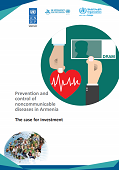Prevention and control of noncommunicable diseases in Armenia. The case for investment (2019)

Download
Noncommunicable diseases (NCDs) such as cancer, cardiovascular disease, diabetes and chronic respiratory diseases and their risk factors are an increasing public health and development challenge in Armenia.
This report provides evidence through three analyses that NCDs reduce economic output and discusses potential options in response, outlining details of their relative returns on investment. An economic burden analysis shows that economic losses from NCDs (direct and indirect costs) comprise 362.7 billion dram, equivalent to 6.5% of gross domestic product in 2017. An intervention costing analysis provides an estimate of the funding required to implement a set of policy interventions for prevention and clinical interventions.
A cost–benefit analysis compares these implementation costs with the estimated health gains and identifies which policy packages would give the greatest returns on investment. For example, the tobacco policy package achieved a return of more than 14.5 dram over 15 years for every 1 dram invested, and for a salt reduction package the equivalent return on investment was more than 14.2 dram for every 1 dram invested.



